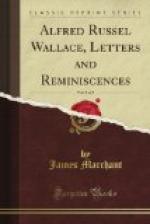Wallace was not even scared out of his wits by ghosts, for, unlike Coleridge, he believed in them although he thought he had seen many. Whether truth came from the scaffold or the throne, the seance or the sky, it did not alter the truth, and did not prejudice or overbear his judgment. He shed his early materialism (which temporarily took possession of him as it did of many others as a result of the shock following the overwhelming discoveries of that period) when he was brought face to face with the phenomena of the spiritual kingdom which withstood the searching test of his keen observation and reasoning powers. Prejudices, preconceived notions, respect for his scientific position or the opinions of his eminent friends or the reputation of the learned societies to which he belonged—all were quietly and firmly put aside when he saw what he recognised to be the truth. If his fellow-workers did not accept it, so much the worse for them. He stood four-square against the onslaught of quasi-scientific rationalism, which once threatened to obliterate all the ancient landmarks of morality and religion alike. He made mistakes, and he admitted and corrected them, because he verily loved Truth for her own sake. And to the very end of his long life he kept the windows of his soul wide open to what he believed to be the light of this and other worlds.
He was, then, a man of lofty ideals, and his idealism was at the base of his opposition to the materialism which boasted that Natural Selection explained all adaptation, and that Physics could give the solution of Huxley’s poser to Spencer: “Given the molecular forces in a mutton chop, deduce Hamlet and Faust therefrom,” and which regarded mind as a quality of matter as brightness is a quality of steel, and life as the result of the organisation of matter and not its cause.
“We have ourselves,” wrote Prof. H.F. Osborn in an account of Wallace’s scientific work which Wallace praised, “experienced a loss of confidence with advancing years, an increasing humility in the face of transformations which become more and more mysterious the more we study them, although we may not join with this master in his appeal to an organising and directing principle.” But profound contemplation of nature and of the mind of




